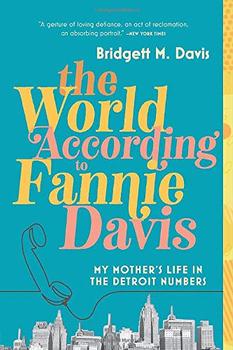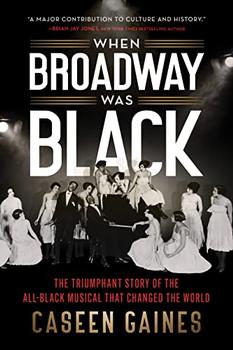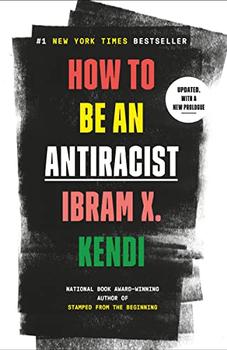Summary | Excerpt | Reviews | Beyond the book | Read-Alikes | Genres & Themes | Author Bio

My Mother's Life in the Detroit Numbers
by Bridgett M. DavisDevoted daughter Bridgett M. Davis was always inspired by her mother Fannie, who provided stability, warmth and generosity to all who entered her home. However, few people knew of Fannie's double-life and the ingenious entrepreneurial spirit hidden beneath the surface. Six days a week, Fannie ran an underground business in Detroit, working the illegal lottery system known as the Numbers. Now, years after Fannie's death, Bridgett shares a holistic picture of her mom's life and legacy as a working-class woman, migrant and African-American.
Prior to becoming the dynamic mother and provider Bridgett knew and loved, Fannie was a bright and focused girl from Tennessee who dreamed of attending Vanderbilt University and majoring in history. Instead, she married her high school sweetheart John, and they soon had their first of five children. By the mid-1950s, eager to earn more money through factory work and escape the violence and terror of Jim Crow legislation, the family traveled from Tennessee to Michigan, eventually settling in Detroit.
Despite the hope held by the young family, Detroit posed its own challenges. The Great Migration—the movement of as many as 6 million people from rural areas in the South to cities in the North and West between 1916 and 1970—created housing shortages, which gave way to poor, unsafe living conditions. John's ailing health paired with harsh, discriminatory working conditions at General Motors prevented a steady paycheck from coming home. Faced with these problems, Fannie figured out how to "make a way out of no way." The answer? The Numbers. As a player of this underground lottery system, Fannie hit a lucky win that provided enough money to invest in property, a rarity for working-class people of color at the time. Later, she entered into the Numbers business, rotating between the roles of bookie and banker. As a bookie, Fannie recorded bets, tracked tabs, delivered wins and collected losses; as a banker, she acquired the additional stress of financing every win her clients made, but also profited off of every loss.
Although gambling games always favor the house—in this case, with 1,000-to-one odds—Fannie's work was laden with risks, including police busts, break-ins, armed robbery and financial wipe-outs. Despite these hazards, Fannie created the illusion of stability and security, especially to Bridgett, the youngest child, who was enthralled by the duality of her mother's life. To Bridgett, her mom—and by extension, her mom's profession—was magical. Many children idolize their parents, and Fannie's charismatic personality, lucky hunches and lavish taste added to the allure. Her luck-enhancing rituals captivated young Bridgett too, such as the special way she burned sage, frankincense and sandalwood to uncover powerful three-digit combinations in ash. Everywhere Fannie went and everything Fannie did, winning numbers came to her: on the tab at a restaurant, on a time stamp from the factory, on the birth date of a relative, on the address of a house.
In remembering her mother's life and her own childhood, Bridgett explores some of the communal gestures and collective memories that shaped Detroit. Those familiar with the city in the 1960s, '70s and '80s will experience nostalgia through the descriptions of formerly thriving commercial sectors, like Hudson's Department Store and the Renaissance Center. Music memories surface as Bridgett describes the icons who lived down the street from her (including Diana Ross), and the playlist of Motown favorites and funky tunes that ushered in new eras. Just as these cultural touchstones are inextricably linked to many people's recollections of Detroit, so are the Numbers.
Bridgett views the Numbers as a grassroots game, in which the dissemination of winnings allowed individuals to invest in their communities, creating a better life for folks in trying situations. Fannie's influence went far beyond her family, thanks largely to the bounty created by her business. With a philanthropic spirit, she donated to organizations such as the National Association for the Advancement of Colored People (NAACP). She sought out those who were struggling, especially young people, and invested in their well-being, providing food, clothes, education and opportunity. She also frequented black-owned, migrant-owned and women-owned local businesses on a regular basis. Bridgett's recollections about the Numbers reveal that some illegal enterprises have been legitimate agents of social good, because generous, respectable people like Fannie were at the helm.
The World According to Fannie Davis speaks to broader social struggles related to class, race, gender and migrancy. But at its heart, it is a story about family. Readers can sit at the table with Bridgett's aunts and childhood friends, recalling stories from the old days, learning about Fannie's perspective through the interviews, letters, public documents, obituaries, poems and memories compiled by her daughter. Despite how inviting and approachable the family-based storytelling is, sometimes the narrative rambles, with occasional overly repetitive details surfacing across chapters, and there is some disorganization, with memories and anecdotes surfacing in a non-chronological fashion and jumbling the timeline. Nevertheless, this memoir captivates, balancing between the relatability of inter-generational family relationships—the admiration, tension, struggle and loss within them—and the magnetism of lucrative, risky black-market business.
![]() This review was originally published in The BookBrowse Review in February 2019, and has been updated for the
February 2020 edition.
Click here to go to this issue.
This review was originally published in The BookBrowse Review in February 2019, and has been updated for the
February 2020 edition.
Click here to go to this issue.

If you liked The World According to Fannie Davis, try these:

by Caseen Gaines
Published 2023
The triumphant story of how an all-Black Broadway cast and crew changed musical theatre—and the world—forever.

by Ibram X. Kendi
Published 2023
From the National Book Award–winning author of Stamped from the Beginning comes a bracingly original approach to understanding and uprooting racism and inequality in our society - and in ourselves.
Never doubt that a small group of thoughtful, committed people can change the world...
Click Here to find out who said this, as well as discovering other famous literary quotes!
Your guide toexceptional books
BookBrowse seeks out and recommends the best in contemporary fiction and nonfiction—books that not only engage and entertain but also deepen our understanding of ourselves and the world around us.